Module 3 Body Language and Non-Verbal Communication 短语和习题
文档属性
| 名称 | Module 3 Body Language and Non-Verbal Communication 短语和习题 |
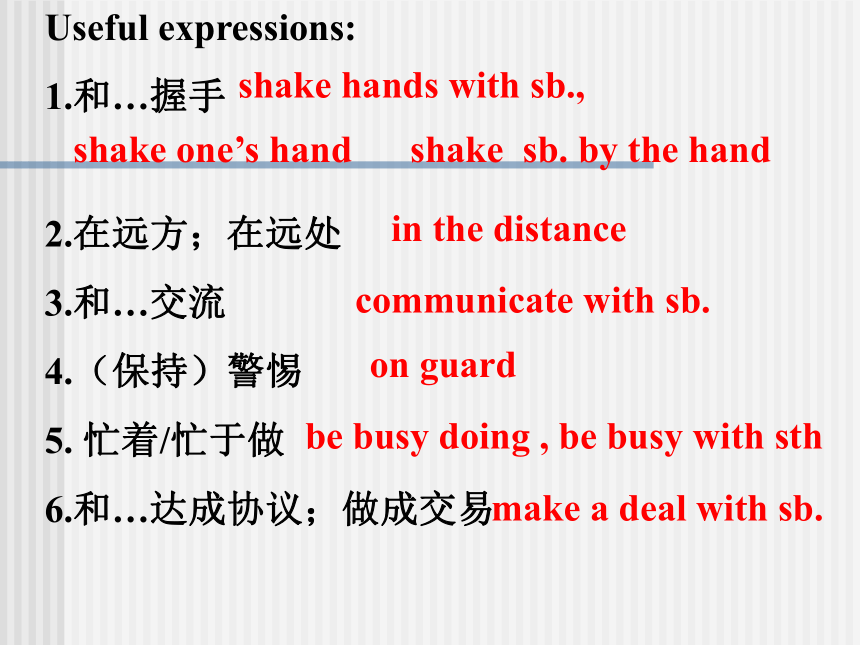
|
|
| 格式 | rar | ||
| 文件大小 | 29.3KB | ||
| 资源类型 | 教案 | ||
| 版本资源 | 外研版 | ||
| 科目 | 英语 | ||
| 更新时间 | 2009-05-31 00:00:00 | ||
图片预览

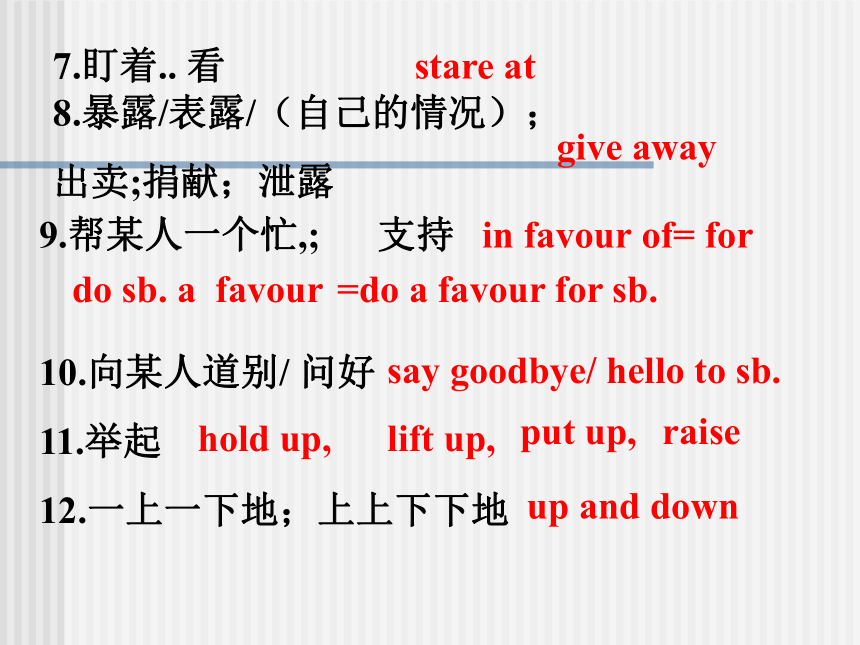
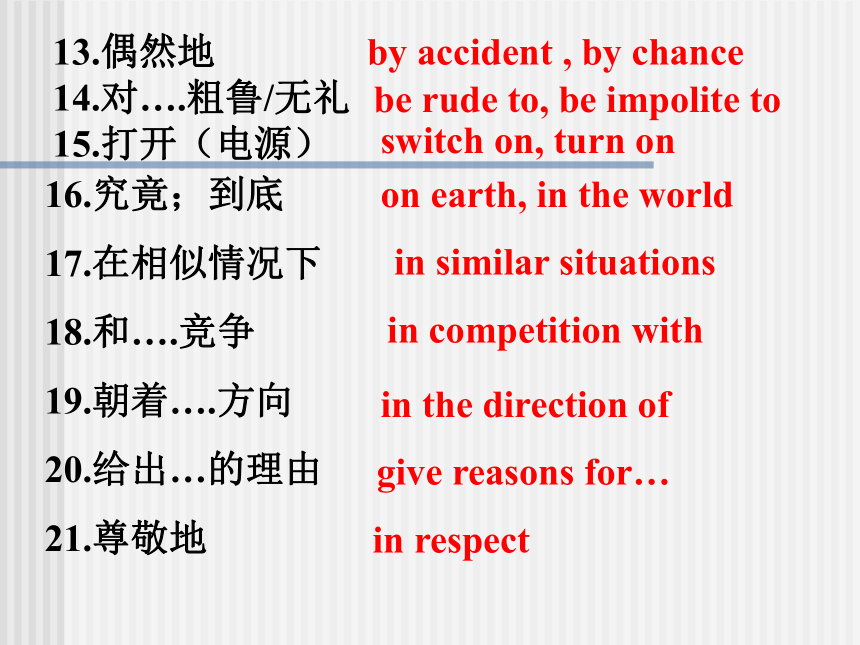
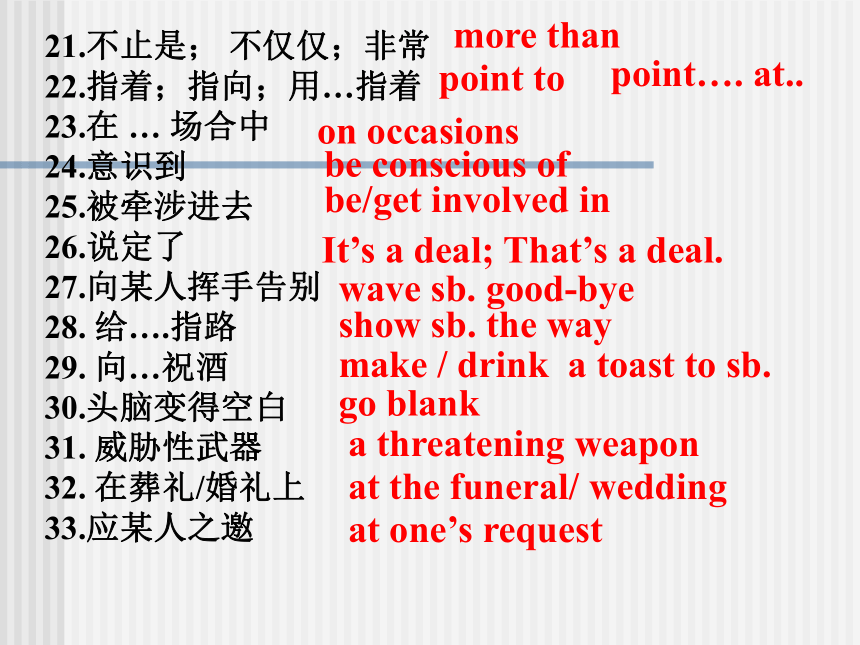
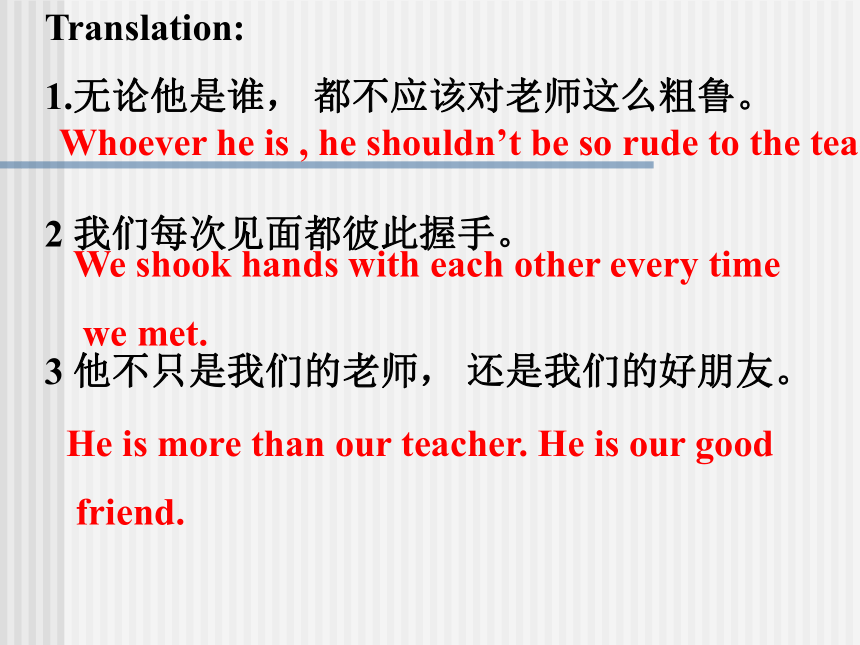
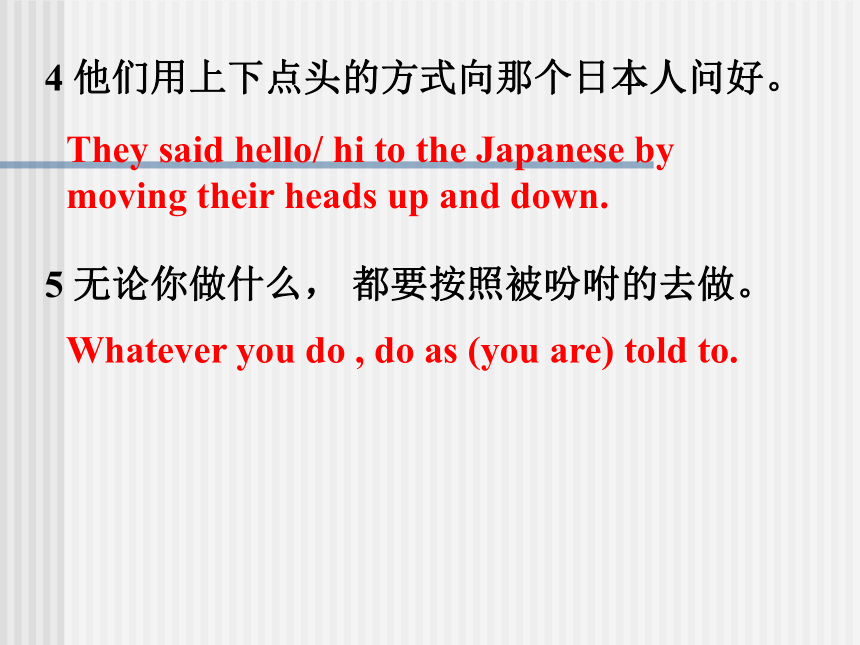
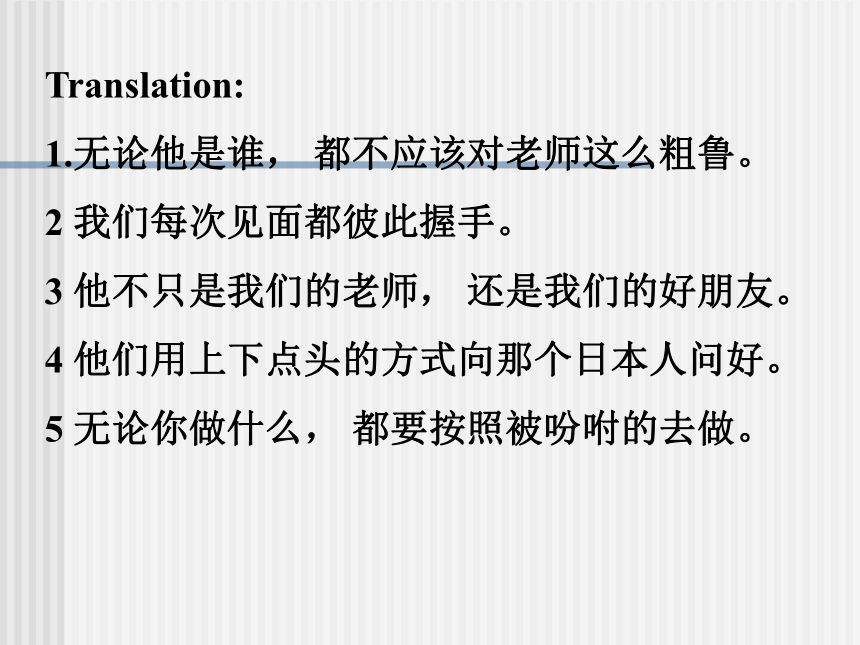

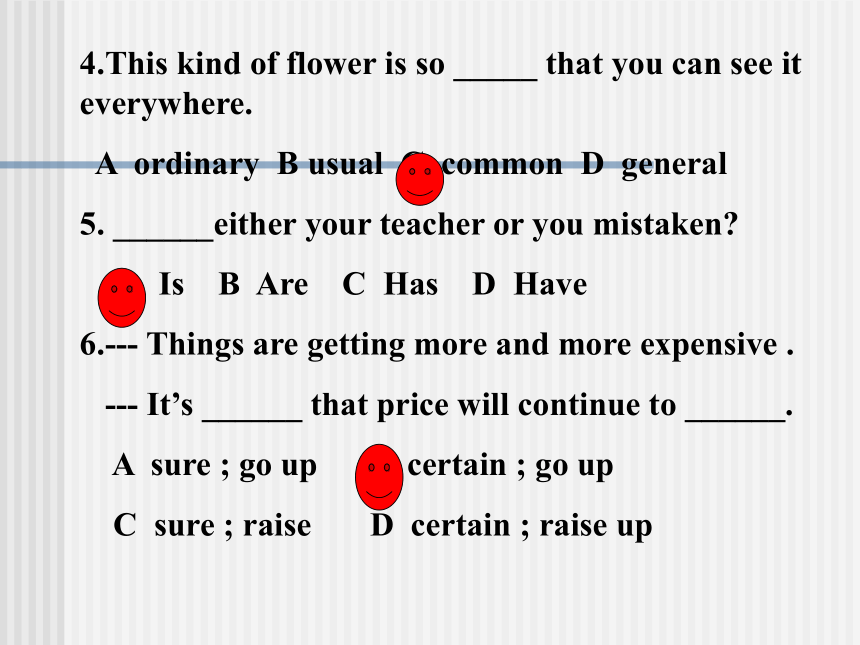
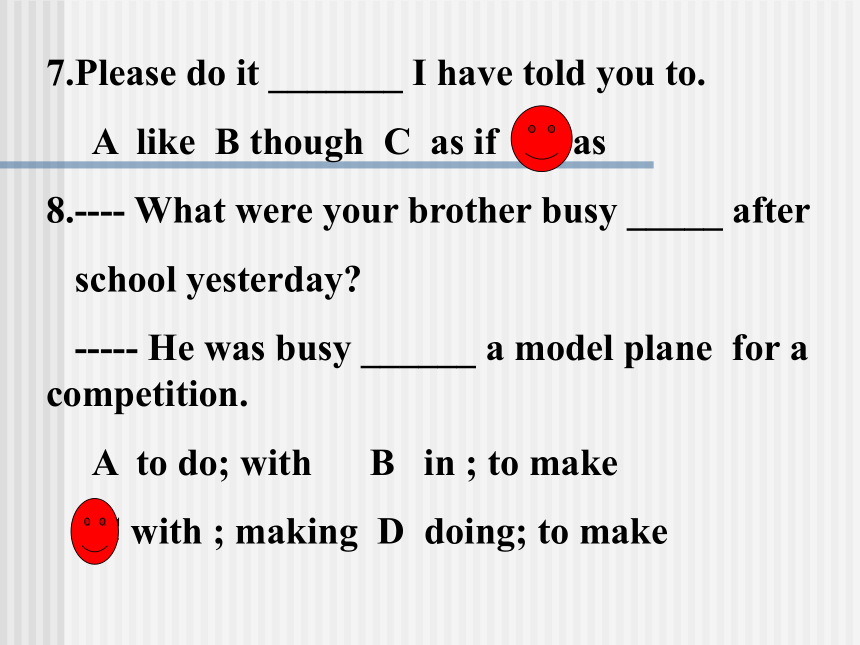
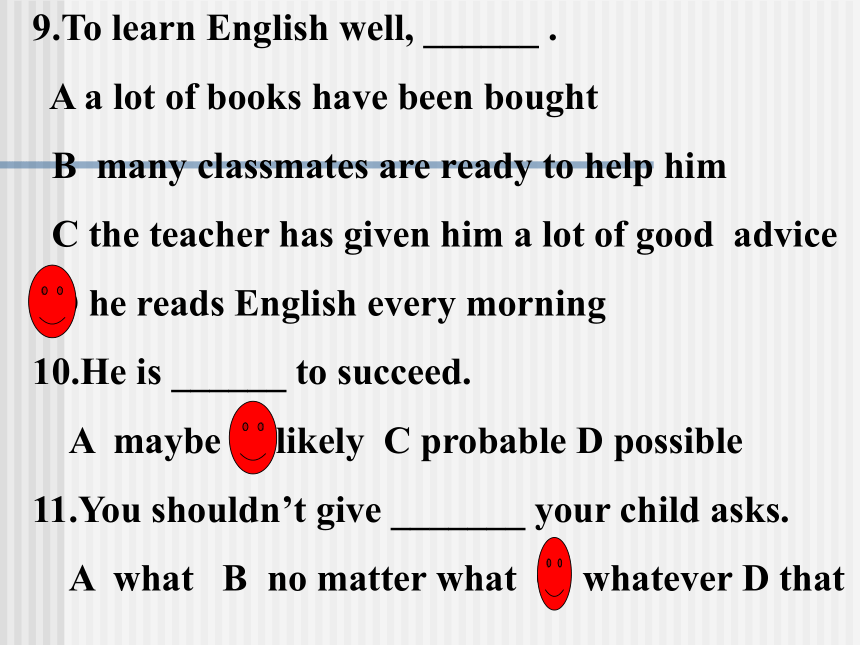
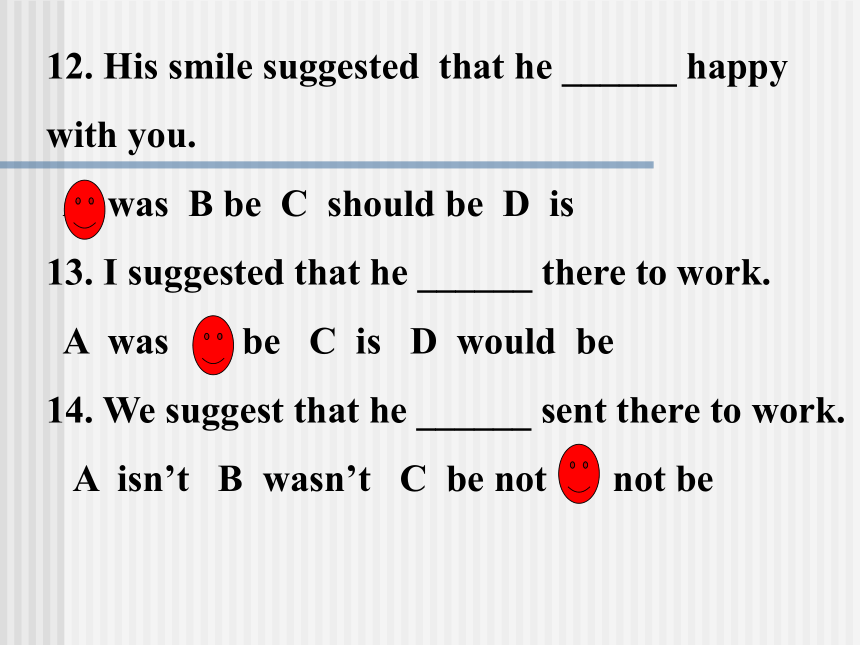
文档简介
课件38张PPT。Useful expressions:
1.和…握手
2.在远方;在远处
3.和…交流
4.(保持)警惕
5. 忙着/忙于做
6.和…达成协议;做成交易shake hands with sb., shake one’s handshake sb. by the hand in the distance communicate with sb. on guard be busy doing , be busy with sth make a deal with sb.9.帮某人一个忙,; 支持
10.向某人道别/ 问好
11.举起
12.一上一下地;上上下下地
8.暴露/表露/(自己的情况);
出卖;捐献;泄露 give away do sb. a favour say goodbye/ hello to sb. hold up, lift up,put up,raiseup and down=do a favour for sb. in favour of= for7.盯着.. 看 stare at16.究竟;到底
17.在相似情况下
18.和….竞争
19.朝着….方向
20.给出…的理由
21.尊敬地 on earth, in the world in similar situations in competition with in the direction of give reasons for… in respect 13.偶然地
14.对….粗鲁/无礼
15.打开(电源) switch on, turn on be rude to, be impolite to by accident , by chance21.不止是; 不仅仅;非常
22.指着;指向;用…指着
23.在 … 场合中
24.意识到
25.被牵涉进去
26.说定了
27.向某人挥手告别
28. 给….指路
29. 向…祝酒
30.头脑变得空白
31. 威胁性武器
32. 在葬礼/婚礼上
33.应某人之邀
more thanpoint to point…. at..on occasionsbe conscious ofbe/get involved in It’s a deal; That’s a deal. wave sb. good-byeshow sb. the waymake / drink a toast to sb.go blank a threatening weapon at the funeral/ wedding at one’s requestTranslation:
1.无论他是谁, 都不应该对老师这么粗鲁。
2 我们每次见面都彼此握手。
3 他不只是我们的老师, 还是我们的好朋友。Whoever he is , he shouldn’t be so rude to the teacher.We shook hands with each other every time
we met. He is more than our teacher. He is our good
friend.4 他们用上下点头的方式向那个日本人问好。
5 无论你做什么, 都要按照被吩咐的去做。They said hello/ hi to the Japanese by
moving their heads up and down.Whatever you do , do as (you are) told to.Translation:
1.无论他是谁, 都不应该对老师这么粗鲁。
2 我们每次见面都彼此握手。
3 他不只是我们的老师, 还是我们的好朋友。
4 他们用上下点头的方式向那个日本人问好。
5 无论你做什么, 都要按照被吩咐的去做。Multiple choice:
1.There’s no easy solution ______ this problem.
A about B at C against D to
2._______ telephones , ______ them I’m out.
A No matter who ; telling B Whoever; tell
C Anyone who ; to tell D Who; tell
3._______ the light off, he couldn’t go on
with his work.
A Until B As C With D Because4.This kind of flower is so _____ that you can see it everywhere.
A ordinary B usual C common D general
5. ______either your teacher or you mistaken?
A Is B Are C Has D Have
6.--- Things are getting more and more expensive .
--- It’s ______ that price will continue to ______.
A sure ; go up B certain ; go up
C sure ; raise D certain ; raise up 7.Please do it _______ I have told you to.
A like B though C as if D as
8.---- What were your brother busy _____ after
school yesterday?
----- He was busy ______ a model plane for a competition.
A to do; with B in ; to make
C with ; making D doing; to make9.To learn English well, ______ .
A a lot of books have been bought
B many classmates are ready to help him
C the teacher has given him a lot of good advice
D he reads English every morning
10.He is ______ to succeed.
A maybe B likely C probable D possible
11.You shouldn’t give _______ your child asks.
A what B no matter what C whatever D that12. His smile suggested that he ______ happy
with you.
A was B be C should be D is
13. I suggested that he ______ there to work.
A was B be C is D would be
14. We suggest that he ______ sent there to work.
A isn’t B wasn’t C be not D not be15.Teachers do _____ teach us school lessons. They educate us to be useful persons.
A much B more than C rather than D and
16.All the children _____ in the school play and they are in high spirits.
A are involving B involve
C are involved D have involved 17. We usually walk ______ the river bank over there, but today I feel tired and won’t walk ____ far.
A as long as ; so B as far as ; that
C as often as ; such D as soon as ; very
18.---how was it that they discovered the entrance to the underground place?
---- Totally _____.
A with any means B by accident
C in a case D by design
Word spelling:
1.They were carrying ________(武器).
2.Bird flu has ________ (传播)all over the
world.
3.In England , turkey is ____________ (传统地)
eaten on Christmas Day.
4.One must be c_______ of his shortcomings.
5.Several officials were i________ in the matter.
6.They c____________ the news to all parts of the world by radio.weaponsspreadtraditionallyonsciousnvolvedommunicatedLanguage points:
1.read v.看懂,读懂,理解, 标明(1)The child can read the clock now.( )
(2)He reads English , but doesn’t speak it.( )
(3)How do you read the passage?( )
(4)Let’s read a riddle. ( )
(5)There is a board , reading “No parking!”( )看懂读懂理解标明理解,猜出2. no more than 仅仅more than 不只是,不仅仅,非常I have no more than twenty books.(1)He is more than our teacher . He is our
good friend.
(2) China Daily is more than a newspaper . It
can help us learn English.
(3)Hearing the news , he was more than angry.不只是不只是非常 3.Indeed , body positions are part of what we call
“body language”.(1) “call +sb./ sth. + 名词 ” “把…..叫做”We call him Mary.
We call it “body language ”(1)This is the book _______ I bought yesterday.
(2)This is ________ I bought yesterday
(3)This is all ______ I bought yesterday.
(4)This is _____ I bought yesterday . that what that what (2)what = something that , all that (5)Body positions are part of the things _____
we call “body language”(6)Body positions are part of _____ we call
“body language”试比较:thatwhat( 7)Eventually , we came to the island ______
Napoleon found first.
(8)Eventually , we came to_______ Napoleon found first.
thatwhatwhat (9) (2002 上海春季,38)
When you answer questions in a job interview , please remember the golden rule:Always give the monkey exactly _______ he wants.
A what B which C when D that
(10) (NME 2001, 31)
A computer can only do _______you have instructed it to do.
A how B after C what D when (11)After five hours’ drive, they reached ____
they thought was the place they’ve been
dreaming of.
A what B that C which D where
(12)The soldiers soon reached _______ was
once an old temple ______ the villagers used
as a school. A which ; where B what ; which
C what ; where D where ; which 4. Though it was raining , (yet) we went on working .
It was raining , yet we went on working.
It was raining , but/ still we went on working.5. One person then holds up his hand , with palm outwards. He came in, (with) a book in his hand.He went to school , (with) a bag on his back He went to sleep, (with) the door closed He came in, book in hand.(1) “(with) + 宾语+ 宾补”, 独立主格结构(2) hold 举行,握住, 容纳The coming Olympic Games will be held in
Beijing in 2008.
The hall can hold 2000 peoplehold up 举起,阻止hold back 阻止, 抑制 hold on继续, 抓住不放, (打电话时)不挂断(= seat / accommodate )Nobody can hold him back from going to school.
I was held up in the traffic jam.
I’m coming. Please hold on/hold the line .If you say the word “_____________”, most people think of words and sentences.Although these are very important , we ___________ with _____ ______ just spoken and _______ words . Indeed, body positions are part of _______ we
call “body language” .We see examples of ___________ body language very often , ______ there is also “______ ” body language, ________ varies _____ culture _____ culture.communicationcommunicatemore thanwrittenwhatlearnedyetwhichfromtounconsciousWe use “learned” body language when we are
____________ to strangers. Like other animals , we are ____ _____ until we know it is safe to
relax. So every culture has developed a ______ way to ______ strangers, to show them we we are not ________. __________, Europeans and
Americans _______ hands. They do this with the right hand ---- the ________ hand for most people. introducedon guardformalgreetaggressiveintroducedTraditionallyshake strongestIf our right hand is busy ______ someone, it cannot be holding a _______.So the gesture is saying, “ I trust you . Look , I’m not carrying a __________ weapon.” If you shake hands _______ someone , you show you trust them. We shake hands when we _____ a ______. It means ,“We agree and we trust”.
greetingthreateningweaponmakedealwith_________ in Asian countries do not involve________ the other person, but they always involve the hands. ___________in China, when we greet someone, we put the right hand ______ the left and bow ________.
Muslims give a “salaam”, ______ they touch their heart , mouth and _______. Hindus _______
their hands and bow their heads ____ _______. In all of these examples , the hands are busy ______ the greeting and cannot _______ a weapon.Greetings touching overTraditionally, slightlywhereforeheadjoinin respectwithholdEven today , when some people have very ________ styles of greeting, they still use their hands as a ________ of trust. American _______
often greet each other _____ the expression “Give me five!” One person then _______ _____
his hand , _____ ________ and five fingers ______.The other person raises his hand and slaps _____ ______ open hand above the head _____ a “high five”.
Nowadays , it is _____ _____ common greeting.informalgestureyouthswith holds up palm outwards spread the other’s in quite aBody language is fascinating ____ anyone _____
study. People ______ _______ much more ____
their gestures than _____ their words. Look at your friends and family and see if you are a ______ _______. for to give away by by mind readerWord spelling:
1.______________(传统地), the company’s main markets have been Britain and the US.
2.The _______(年轻人) were throwing stones
and bottles at the police.
3.She sat on the floor ________ (抱)her knees.
4.Television is an increasingly important
means of c_________.
5.She was hit on the head by a stone and knocked
u_________. Traditionallyyouthshuggingommunicationnconscious6.The fire s________ very rapidly because of the strong wind.
7.Thanks for the i_________ to your birthday
party.
8. Chuck sat quietly for hours (盯着看)in the distance, thinking of what might have been.
9. Prices v with the season.
10. We s________ the table cloth out on the ground and sat down to eat.preadnvitationstaringarypreadCorrection:
1.When the bell rang , I noticed the clock
pointed at twelve.
2. At the distance, there were some people shouting to us. But I couldn’t hear them.
3. Please tell me the reason of your keeping him from going to the party.
4. You have failed the exam for three times. Would you like to have another try?
at---toAt----In去掉forof---for5. The policeman caught her by her arm, but
several minutes later, she broke away from him.
6. It is so quiet the library. You can’t talk with
others, or you will be punished.
7. I will not let you enter the room unless you don’t tell me what has happened.
8. They haven’t realized that it takes to set up such a school.
her---thecan’t----mustn’t去掉don’tthat---what 9. This is his request that he will be sent there.
10.He requests that I am not invited to the party.
11.We shook hand with each other when we met.
12.The car went away to the direction of Beijing.
13.He pointed his gun to the tiger.去掉willam not 改为 not be______hands__in__at Fill in the blanks with living, alive, live , lively
(1)I bought two _____ fish.
(2)Thanks to the satellite, football games come to us _______ on TV.
(3)He is the only greatest ______ man of his times.
(4)He is the only greatest man ______ of his times.
(5)He has many ways to make his classes ______
and interesting.
livelivelivingalivelively3. Say what you do when you…
(1)Meet a friend .
(2)Show someone the way
(3)See a friend in the distance
(4)Enter a friend’s houseI shake hands and say “pleased to meet you”I point in the direction they must goI wave my hand I shake hands and say “hello, pleaded to
see you .” (5)Say yes
(6)Say no
(7)Say who? me?
(8)Say goodbyeI nod my head up and downI shake my head from side to sideI point to myself and put on a surprised
expression.Ishake hands and say , “good bye .”
1.和…握手
2.在远方;在远处
3.和…交流
4.(保持)警惕
5. 忙着/忙于做
6.和…达成协议;做成交易shake hands with sb., shake one’s handshake sb. by the hand in the distance communicate with sb. on guard be busy doing , be busy with sth make a deal with sb.9.帮某人一个忙,; 支持
10.向某人道别/ 问好
11.举起
12.一上一下地;上上下下地
8.暴露/表露/(自己的情况);
出卖;捐献;泄露 give away do sb. a favour say goodbye/ hello to sb. hold up, lift up,put up,raiseup and down=do a favour for sb. in favour of= for7.盯着.. 看 stare at16.究竟;到底
17.在相似情况下
18.和….竞争
19.朝着….方向
20.给出…的理由
21.尊敬地 on earth, in the world in similar situations in competition with in the direction of give reasons for… in respect 13.偶然地
14.对….粗鲁/无礼
15.打开(电源) switch on, turn on be rude to, be impolite to by accident , by chance21.不止是; 不仅仅;非常
22.指着;指向;用…指着
23.在 … 场合中
24.意识到
25.被牵涉进去
26.说定了
27.向某人挥手告别
28. 给….指路
29. 向…祝酒
30.头脑变得空白
31. 威胁性武器
32. 在葬礼/婚礼上
33.应某人之邀
more thanpoint to point…. at..on occasionsbe conscious ofbe/get involved in It’s a deal; That’s a deal. wave sb. good-byeshow sb. the waymake / drink a toast to sb.go blank a threatening weapon at the funeral/ wedding at one’s requestTranslation:
1.无论他是谁, 都不应该对老师这么粗鲁。
2 我们每次见面都彼此握手。
3 他不只是我们的老师, 还是我们的好朋友。Whoever he is , he shouldn’t be so rude to the teacher.We shook hands with each other every time
we met. He is more than our teacher. He is our good
friend.4 他们用上下点头的方式向那个日本人问好。
5 无论你做什么, 都要按照被吩咐的去做。They said hello/ hi to the Japanese by
moving their heads up and down.Whatever you do , do as (you are) told to.Translation:
1.无论他是谁, 都不应该对老师这么粗鲁。
2 我们每次见面都彼此握手。
3 他不只是我们的老师, 还是我们的好朋友。
4 他们用上下点头的方式向那个日本人问好。
5 无论你做什么, 都要按照被吩咐的去做。Multiple choice:
1.There’s no easy solution ______ this problem.
A about B at C against D to
2._______ telephones , ______ them I’m out.
A No matter who ; telling B Whoever; tell
C Anyone who ; to tell D Who; tell
3._______ the light off, he couldn’t go on
with his work.
A Until B As C With D Because4.This kind of flower is so _____ that you can see it everywhere.
A ordinary B usual C common D general
5. ______either your teacher or you mistaken?
A Is B Are C Has D Have
6.--- Things are getting more and more expensive .
--- It’s ______ that price will continue to ______.
A sure ; go up B certain ; go up
C sure ; raise D certain ; raise up 7.Please do it _______ I have told you to.
A like B though C as if D as
8.---- What were your brother busy _____ after
school yesterday?
----- He was busy ______ a model plane for a competition.
A to do; with B in ; to make
C with ; making D doing; to make9.To learn English well, ______ .
A a lot of books have been bought
B many classmates are ready to help him
C the teacher has given him a lot of good advice
D he reads English every morning
10.He is ______ to succeed.
A maybe B likely C probable D possible
11.You shouldn’t give _______ your child asks.
A what B no matter what C whatever D that12. His smile suggested that he ______ happy
with you.
A was B be C should be D is
13. I suggested that he ______ there to work.
A was B be C is D would be
14. We suggest that he ______ sent there to work.
A isn’t B wasn’t C be not D not be15.Teachers do _____ teach us school lessons. They educate us to be useful persons.
A much B more than C rather than D and
16.All the children _____ in the school play and they are in high spirits.
A are involving B involve
C are involved D have involved 17. We usually walk ______ the river bank over there, but today I feel tired and won’t walk ____ far.
A as long as ; so B as far as ; that
C as often as ; such D as soon as ; very
18.---how was it that they discovered the entrance to the underground place?
---- Totally _____.
A with any means B by accident
C in a case D by design
Word spelling:
1.They were carrying ________(武器).
2.Bird flu has ________ (传播)all over the
world.
3.In England , turkey is ____________ (传统地)
eaten on Christmas Day.
4.One must be c_______ of his shortcomings.
5.Several officials were i________ in the matter.
6.They c____________ the news to all parts of the world by radio.weaponsspreadtraditionallyonsciousnvolvedommunicatedLanguage points:
1.read v.看懂,读懂,理解, 标明(1)The child can read the clock now.( )
(2)He reads English , but doesn’t speak it.( )
(3)How do you read the passage?( )
(4)Let’s read a riddle. ( )
(5)There is a board , reading “No parking!”( )看懂读懂理解标明理解,猜出2. no more than 仅仅more than 不只是,不仅仅,非常I have no more than twenty books.(1)He is more than our teacher . He is our
good friend.
(2) China Daily is more than a newspaper . It
can help us learn English.
(3)Hearing the news , he was more than angry.不只是不只是非常 3.Indeed , body positions are part of what we call
“body language”.(1) “call +sb./ sth. + 名词 ” “把…..叫做”We call him Mary.
We call it “body language ”(1)This is the book _______ I bought yesterday.
(2)This is ________ I bought yesterday
(3)This is all ______ I bought yesterday.
(4)This is _____ I bought yesterday . that what that what (2)what = something that , all that (5)Body positions are part of the things _____
we call “body language”(6)Body positions are part of _____ we call
“body language”试比较:thatwhat( 7)Eventually , we came to the island ______
Napoleon found first.
(8)Eventually , we came to_______ Napoleon found first.
thatwhatwhat (9) (2002 上海春季,38)
When you answer questions in a job interview , please remember the golden rule:Always give the monkey exactly _______ he wants.
A what B which C when D that
(10) (NME 2001, 31)
A computer can only do _______you have instructed it to do.
A how B after C what D when (11)After five hours’ drive, they reached ____
they thought was the place they’ve been
dreaming of.
A what B that C which D where
(12)The soldiers soon reached _______ was
once an old temple ______ the villagers used
as a school. A which ; where B what ; which
C what ; where D where ; which 4. Though it was raining , (yet) we went on working .
It was raining , yet we went on working.
It was raining , but/ still we went on working.5. One person then holds up his hand , with palm outwards. He came in, (with) a book in his hand.He went to school , (with) a bag on his back He went to sleep, (with) the door closed He came in, book in hand.(1) “(with) + 宾语+ 宾补”, 独立主格结构(2) hold 举行,握住, 容纳The coming Olympic Games will be held in
Beijing in 2008.
The hall can hold 2000 peoplehold up 举起,阻止hold back 阻止, 抑制 hold on继续, 抓住不放, (打电话时)不挂断(= seat / accommodate )Nobody can hold him back from going to school.
I was held up in the traffic jam.
I’m coming. Please hold on/hold the line .If you say the word “_____________”, most people think of words and sentences.Although these are very important , we ___________ with _____ ______ just spoken and _______ words . Indeed, body positions are part of _______ we
call “body language” .We see examples of ___________ body language very often , ______ there is also “______ ” body language, ________ varies _____ culture _____ culture.communicationcommunicatemore thanwrittenwhatlearnedyetwhichfromtounconsciousWe use “learned” body language when we are
____________ to strangers. Like other animals , we are ____ _____ until we know it is safe to
relax. So every culture has developed a ______ way to ______ strangers, to show them we we are not ________. __________, Europeans and
Americans _______ hands. They do this with the right hand ---- the ________ hand for most people. introducedon guardformalgreetaggressiveintroducedTraditionallyshake strongestIf our right hand is busy ______ someone, it cannot be holding a _______.So the gesture is saying, “ I trust you . Look , I’m not carrying a __________ weapon.” If you shake hands _______ someone , you show you trust them. We shake hands when we _____ a ______. It means ,“We agree and we trust”.
greetingthreateningweaponmakedealwith_________ in Asian countries do not involve________ the other person, but they always involve the hands. ___________in China, when we greet someone, we put the right hand ______ the left and bow ________.
Muslims give a “salaam”, ______ they touch their heart , mouth and _______. Hindus _______
their hands and bow their heads ____ _______. In all of these examples , the hands are busy ______ the greeting and cannot _______ a weapon.Greetings touching overTraditionally, slightlywhereforeheadjoinin respectwithholdEven today , when some people have very ________ styles of greeting, they still use their hands as a ________ of trust. American _______
often greet each other _____ the expression “Give me five!” One person then _______ _____
his hand , _____ ________ and five fingers ______.The other person raises his hand and slaps _____ ______ open hand above the head _____ a “high five”.
Nowadays , it is _____ _____ common greeting.informalgestureyouthswith holds up palm outwards spread the other’s in quite aBody language is fascinating ____ anyone _____
study. People ______ _______ much more ____
their gestures than _____ their words. Look at your friends and family and see if you are a ______ _______. for to give away by by mind readerWord spelling:
1.______________(传统地), the company’s main markets have been Britain and the US.
2.The _______(年轻人) were throwing stones
and bottles at the police.
3.She sat on the floor ________ (抱)her knees.
4.Television is an increasingly important
means of c_________.
5.She was hit on the head by a stone and knocked
u_________. Traditionallyyouthshuggingommunicationnconscious6.The fire s________ very rapidly because of the strong wind.
7.Thanks for the i_________ to your birthday
party.
8. Chuck sat quietly for hours (盯着看)in the distance, thinking of what might have been.
9. Prices v with the season.
10. We s________ the table cloth out on the ground and sat down to eat.preadnvitationstaringarypreadCorrection:
1.When the bell rang , I noticed the clock
pointed at twelve.
2. At the distance, there were some people shouting to us. But I couldn’t hear them.
3. Please tell me the reason of your keeping him from going to the party.
4. You have failed the exam for three times. Would you like to have another try?
at---toAt----In去掉forof---for5. The policeman caught her by her arm, but
several minutes later, she broke away from him.
6. It is so quiet the library. You can’t talk with
others, or you will be punished.
7. I will not let you enter the room unless you don’t tell me what has happened.
8. They haven’t realized that it takes to set up such a school.
her---thecan’t----mustn’t去掉don’tthat---what 9. This is his request that he will be sent there.
10.He requests that I am not invited to the party.
11.We shook hand with each other when we met.
12.The car went away to the direction of Beijing.
13.He pointed his gun to the tiger.去掉willam not 改为 not be______hands__in__at Fill in the blanks with living, alive, live , lively
(1)I bought two _____ fish.
(2)Thanks to the satellite, football games come to us _______ on TV.
(3)He is the only greatest ______ man of his times.
(4)He is the only greatest man ______ of his times.
(5)He has many ways to make his classes ______
and interesting.
livelivelivingalivelively3. Say what you do when you…
(1)Meet a friend .
(2)Show someone the way
(3)See a friend in the distance
(4)Enter a friend’s houseI shake hands and say “pleased to meet you”I point in the direction they must goI wave my hand I shake hands and say “hello, pleaded to
see you .” (5)Say yes
(6)Say no
(7)Say who? me?
(8)Say goodbyeI nod my head up and downI shake my head from side to sideI point to myself and put on a surprised
expression.Ishake hands and say , “good bye .”
